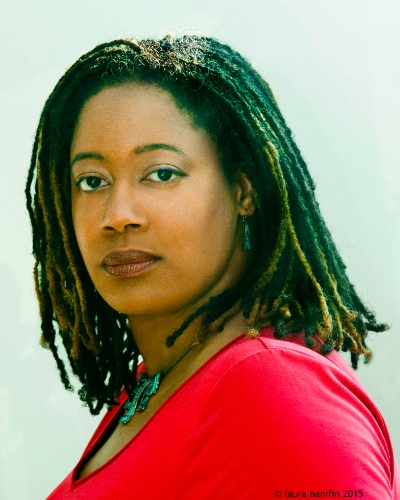“When we say that “the world has ended,” remember—it is usually a lie. The planet is just fine.”
Prologue “me, when I was I” (p. 2)
The Stone Sky (2017)
N.K. Jemisin, właśc. Nora K. Jemisin – amerykańska pisarka fantastyki i blogerka. Jej twórczość obejmuje m.in. konflikt kulturowy i prześladowanie poprzez światy fantasy oraz fantastyczno-naukowe.
W 2010 roku jej opowiadanie Non-Zero Probabilities znalazło się w finale nagród Hugo i Nebula za najlepszą krótką formę literacką. Debiutancka powieść N.K. Jemisin The Hundred Thousand Kingdoms w 2010 r. była nominowana do nagrody Nebula i znalazła się w finale nagrody Jamesa Tiptree Jr. W 2011 roku ta powieść była nominowana do nagród Hugo, World Fantasy i Locusa, wygrywając nagrodę Locusa za debiut powieściowy. The Hundred Thousand Kingdoms zdobyła również w 2011 r. nagrodę Sense of Gender Awards.
W 2016 roku powieść N.K. Jemisin Piąta pora roku, pierwszy tom cyklu Pęknięta Ziemia, zdobyła nagrodę Hugo za najlepszą powieść, ponadto była nominowana do nagród Nebula, Locus i World Fantasy. Sukces powtórzył drugi tom cyklu Pęknięta Ziemia – Wrota Obelisków, zdobywając Nagrodę Hugo za najlepszą powieść oraz otrzymując nominację do nagrody Nebula, Locusa i World Fantasy. Jeszcze bardziej doceniony został trzeci tom cyklu, Kamienne niebo, który zdobył Hugo i Nebulę dla najlepszej powieści oraz Locusa dla najlepszej powieści fantasy. N.K. Jemisin stała się w ten sposób pierwszą autorką w historii, która zdobyła nagrodę Hugo za najlepszą powieść trzykrotnie rok po roku.
Wikipedia

“When we say that “the world has ended,” remember—it is usually a lie. The planet is just fine.”
Prologue “me, when I was I” (p. 2)
The Stone Sky (2017)
Źródło: The Broken Kingdoms (2011), Chapter 11 “Possession” (watercolor) (pp. 202-203)
“It’s all right to need help. All of us have things we can’t do alone.”
Źródło: The Broken Kingdoms (2011), p. 1; repeated twice more in the book
Źródło: The Broken Kingdoms (2011), Chapter 4 “Frustration” (watercolor) (p. 71)
Źródło: The Hundred Thousand Kingdoms (2010), Chapter 7 (p. 74)
Źródło: The Hundred Thousand Kingdoms (2010), Chapter 21 (p. 282)
Źródło: The Hundred Thousand Kingdoms (2010), Chapter 9 (p. 103)
Źródło: The Hundred Thousand Kingdoms (2010), Chapter 29 (p. 394)
More silence.
Źródło: The Broken Kingdoms (2011), Chapter 17 “A Golden Chain” (engraving on metal plate) (p. 311)
Źródło: The Broken Kingdoms (2011), Chapter 4 “Frustration” (watercolor) (p. 60)
Źródło: The Broken Kingdoms (2011), Chapter 9 “Seduction” (charcoal) (p. 185)
“But perhaps that was just the way of power: no such thing as too much.”
Źródło: The Hundred Thousand Kingdoms (2010), Chapter 6 (p. 61)
“There’s not such thing as magic that does no harm.”
Źródło: The Broken Kingdoms (2011), Chapter 4 “Frustration” (watercolor) (p. 93)
“It is important to appreciate beauty, even when it is evil.”
Źródło: The Hundred Thousand Kingdoms (2010), Chapter 7 (p. 75)
Źródło: The Hundred Thousand Kingdoms (2010), Chapter 12 (p. 144)
Źródło: The Hundred Thousand Kingdoms (2010), Chapter 22 (p. 299)
Źródło: The Broken Kingdoms (2011), Chapter 5 “Family” (charcoal study) (p. 105)
“Good intentions are pointless without the will to implement them.”
Źródło: The Broken Kingdoms (2011), Chapter 16 “From the Depths to the Heights” (watercolor) (p. 281)
Źródło: The Broken Kingdoms (2011), Chapter 19 “The Demons’ War” (charcoal and chalk on black paper) (p. 349)
“What happened when people who’d once possessed absolute power suddenly lost it?”
Źródło: The Broken Kingdoms (2011), Chapter 8 “Light Reveals” (encaustic on canvas) (p. 170)
Źródło: The Broken Kingdoms (2011), Chapter 17 “A Golden Chain” (engraving on metal plate) (p. 309)
“There is no greater warrior than a mother protecting her child.”
Źródło: The Hundred Thousand Kingdoms (2010), Chapter 4 (p. 36)
Źródło: The Broken Kingdoms (2011), Chapter 4 “Frustration” (watercolor) (p. 68)
“Love betrayed has an entirely different sound from hatred outright.”
Źródło: The Broken Kingdoms (2011), Chapter 3 “Gods and Corpses” (oil on canvas) (p. 58)
Źródło: The Broken Kingdoms (2011), Chapter 21 “Still Life” (oil on canvas) (p. 378)
Źródło: The Broken Kingdoms (2011), Chapter 9 “Seduction” (charcoal) (p. 189)
Źródło: The Broken Kingdoms (2011), Chapter 20 “Life” (oil study) (p. 364)
Źródło: The Broken Kingdoms (2011), Chapter 5 “Family” (charcoal study) (p. 120)
“But though I repeated my plea, and waited on my knees for nearly an hour, there was no answer.”
Źródło: The Broken Kingdoms (2011), Chapter 9 “Seduction” (charcoal) (p. 181)
“I…regret…what I did. It was wrong. Very wrong. But regret is meaningless.”
Źródło: The Broken Kingdoms (2011), Chapter 16 “From the Depths to the Heights” (watercolor) (p. 283)